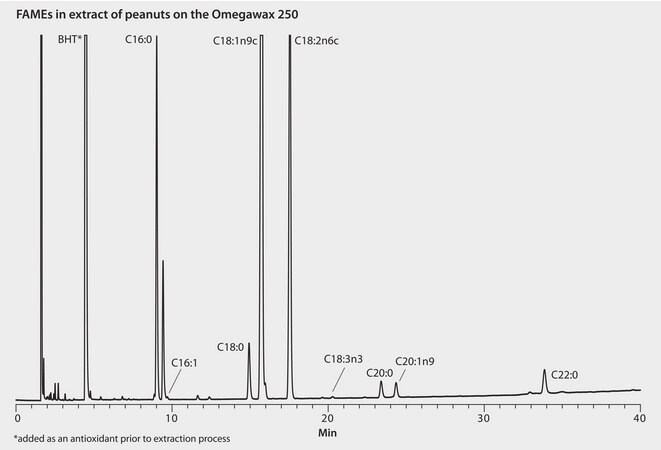GC Analysis of FAMEs in Peanuts on Omegawax

Materials
analytical column
related product
Aldrich® modified Friedrichs condenser with SafetyBarb® tubing connectors
jacket O.D. 37 mm, Overall H 270 mmAldrich® modified Friedrichs condenser with SafetyBarb® tubing connectors
jacket O.D. 37 mm, Overall H 420 mmAldrich® modified Friedrichs condenser with SafetyBarb® tubing connectors
jacket O.D. 54 mm, Overall H 300 mmCONDITIONS
column
OMEGAWAX 250, 30 m x 0.25 mm I.D., 0.25 μm (24136)
oven
170 °C, 1 °C/min to 225 °C
inj. temp.
250 °C
detector
FID, 250 °C
carrier gas
helium, 1.2 mL/min constant flow
injection
1 μL, split 100:1
liner
4 mm ID FocusLiner w/taper
sample
Dry roasted, unsalted peanuts prepared for analysis per AOCS Official Method Ce 1k-09
Description
Analysis Note
This application illustrates the extraction and GC analysis of peanuts for fatty acids. The health benefits of peanuts and peanut oil are associated with their high oleic acid content. Oleic acid is believed to help lower cholesterol and reduce the risk of heart disease. Oleic acid, also found in olive oil, is a major contributor to the health benefits associated with the “Mediterranean Diet.”
The samples were prepared using acid digestion /alkali hydrolysis followed by methylation as described in AOCS Official Method Ce 1k-09. BHT was added as an antioxidant prior to extraction. All samples were concentrated to 1 mL prior to GC analysis. The Omegawax GC column was used in the analysis of the saturated and unsaturated fatty acids present in the sample.
Legal Information
null